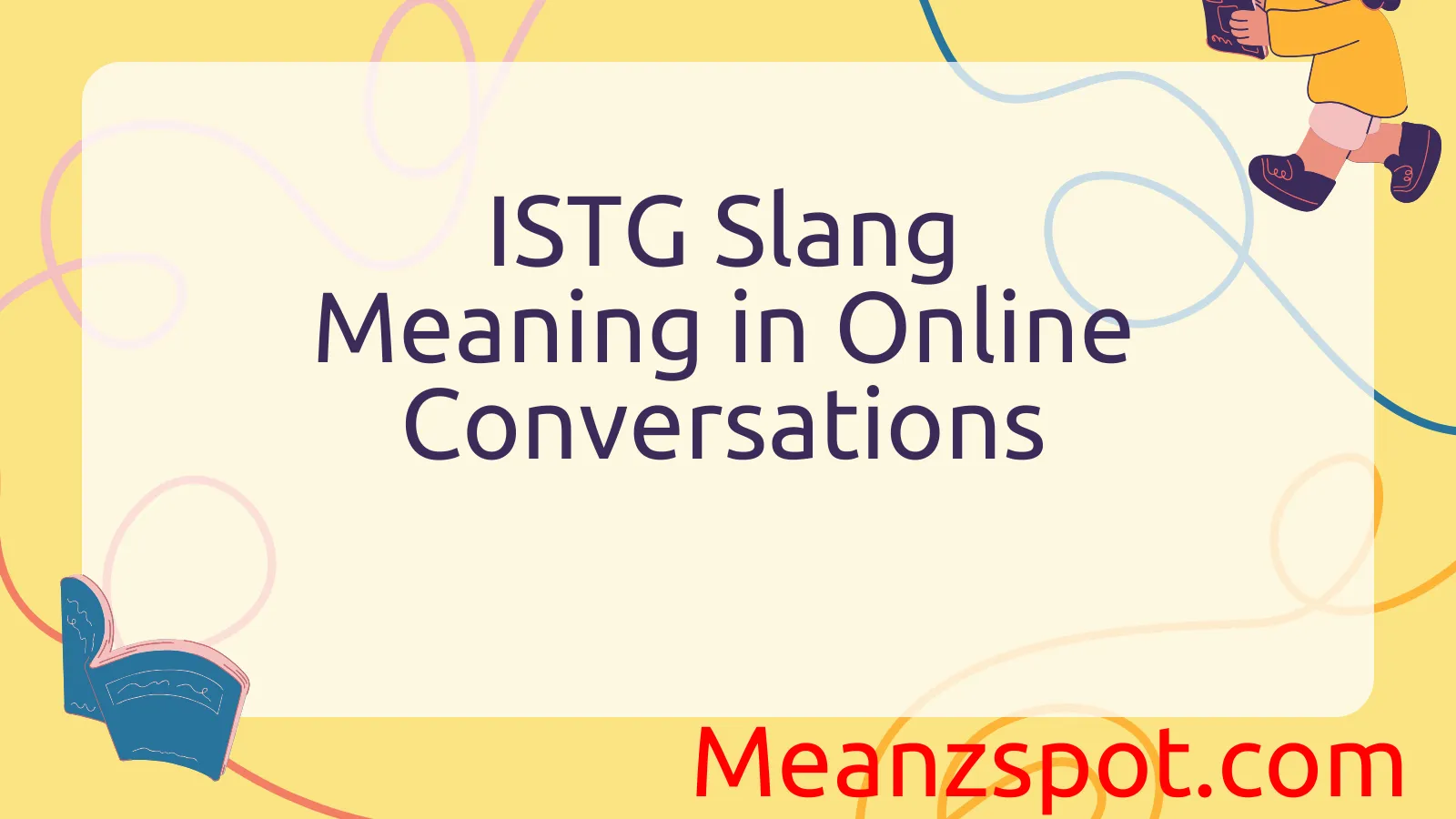The world of texting and online chats is full of short forms that make conversations quicker but sometimes confusing. One abbreviation you might have seen is ISTG, and if you didn’t know what it meant, you’re not alone. Just like popular internet slang such as SMH or FR, this one has become a common way for people to express themselves in casual chats.
So, what does ISTG mean in online conversations? It stands for “I Swear To God.” People use it to show that they’re being serious, honest, or frustrated about something. For example, if someone texts, “ISTG this movie is the best I’ve ever seen,” they’re emphasizing just how much they really mean it. It’s a way of adding intensity and emotion to a message without needing a long explanation.
Definitions & Meaning
ISTG stands for “I Swear To God.” It is an informal phrase used primarily to emphasize the truthfulness, seriousness, or intensity of a statement. When someone uses ISTG, they are typically trying to stress that what they’re saying is genuine or that they are serious about their feelings or claims.
For example:
- “ISTG, if you don’t call me back, I’m going to be really upset.”
- “I didn’t take your book, ISTG!”
The phrase carries a tone that ranges from playful to serious depending on the context. Often, it is used to add emotional weight to a sentence, indicating frustration, anger, excitement, or sincerity.
Origins & History
The phrase “I swear to God” has been used in English for centuries as a solemn oath or to emphasize honesty. However, the acronym ISTG emerged more recently with the rise of texting and online communication in the early 2000s.
As smartphones and instant messaging apps became widespread, people sought quicker ways to communicate their feelings or emphasize their points without typing long sentences. ISTG naturally evolved as a shorthand version of “I swear to God,” gaining traction on platforms like SMS, chat rooms, and later social media.
Its popularity soared among teenagers and young adults who adopted it as part of their digital vocabulary. Over time, ISTG became a staple in meme culture and casual conversations, sometimes even appearing in scripted dialogues in TV shows or online videos to reflect authentic, relatable speech.
Usage in Different Contexts
Social Media and Texting
ISTG is most commonly used in casual conversations on social media platforms like Twitter, Instagram, Snapchat, TikTok, and in texting apps like WhatsApp or iMessage. It helps express strong emotions without sounding too formal.
Example:
- Tweet: “ISTG, if this line doesn’t move soon, I’m going to lose it.”
- Snapchat message: “ISTG, I’m done with this homework!”
Professional Contexts
ISTG is generally not appropriate in professional or formal communication. Using acronyms like ISTG in emails, work chats, or official documents can appear unprofessional or unclear to some recipients.
Pop Culture
ISTG has found its way into pop culture, especially in online memes, comedic videos, and youth-oriented TV shows. Its usage helps convey authentic speech patterns that resonate with younger audiences, often used humorously or dramatically.
Common Misunderstandings & Clarifications
A common misunderstanding is confusing ISTG with similar acronyms or assuming it’s offensive. ISTG is not inherently rude but depends on context and tone. Some people may mistake it for impatience or anger, but often it’s used humorously or casually.
Another point of confusion is pronunciation—ISTG is usually said as individual letters “I-S-T-G” rather than as a word. Additionally, some might wonder if ISTG is a religious statement. While it invokes “God,” in most casual uses, it is more of an emphatic expression than a literal religious oath.
Alternatives & Synonyms
If you want to express a similar sentiment without using ISTG, here are some alternatives:
- “I swear”
- “Honestly”
- “For real”
- “On my life”
- “No joke”
- “Believe me”
- “Cross my heart”
These alternatives vary in tone and formality but can be used interchangeably depending on the situation.
Frequently Asked Questions (FAQ)
1. Is ISTG appropriate for all ages?
Generally, ISTG is informal and best suited for teens and young adults. While not offensive, it may be less understood or considered inappropriate in formal settings.
2. Can ISTG be used in professional communication?
No, it is recommended to avoid ISTG in professional or formal communication to maintain clarity and professionalism.
3. Is ISTG a religious phrase?
Though it references “God,” ISTG is mostly used as a casual emphasis and not necessarily as a religious statement.
4. How do you pronounce ISTG?
It is pronounced by saying each letter individually: “I-S-T-G.”
5. Are there any similar acronyms to ISTG?
Yes, acronyms like IDK (I don’t know), LOL (laugh out loud), or SMH (shaking my head) are similarly popular internet abbreviations.
6. Can ISTG be used humorously?
Absolutely! ISTG is often used in a playful or exaggerated way in jokes or memes.
7. Is ISTG only used in English?
ISTG is primarily an English acronym but can appear globally due to the widespread use of English on the internet.
Conclusion
ISTG is a succinct, expressive acronym that captures the essence of a common spoken phrase—“I swear to God”—in a quick, digital-friendly format. Its popularity in texting and social media reflects the evolving nature of language in the digital age. While it adds color and emphasis to casual communication, understanding when and how to use ISTG is crucial to avoid misunderstandings or appearing unprofessional.
Whether you’re a digital native or just trying to keep up with modern slang, knowing what ISTG means and how it fits into various contexts will help you communicate more effectively and stay connected in today’s fast-moving digital conversations.



